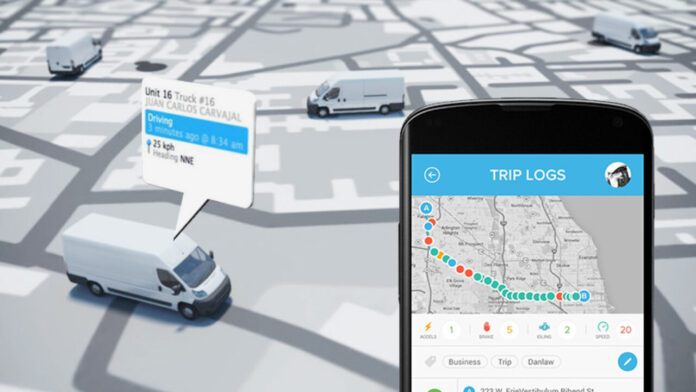The GPS fleet tracking revolution has improved the trucking sector. Although GPS tracking has been around for a while, its efficiency increased with the IoT, i.e., the Internet of Things advent with associated gadgets. Particularly in this trucking sector, fleet managers may monitor every vehicle throughout their fleets via live time, thanks to GPS.
To improve processes, view historical location data and use different data points and essential insights to boost profitability and productivity. GPS tracking is now essential for fleets of various sorts and sizes to operate daily. Here you’ll emphasize the many advantages GPS fleet tracking offers.
8 Benefits of Using GPS Fleet Tracking for Small Businesses

1. Lower the Cost of Fleet Maintenance
Contemporary vehicle monitoring systems come with cutting-edge capabilities like engine temperature, fuel level metrics, vehicle diagnostics, and others that help you keep an eye on essential parts of your car’s health. Additionally, you may get timely warnings when fleet service, including wheel alignments, oil changes, and other standard maintenance, is needed.
By examining the statistics, you may reduce expenses and increase the lifespan of your automobiles and their components by doing away with pointless vehicle checkups and then only performing service when required.
2. GPS Fleet Tracking Improves Productivity
GPS fleet tracking may significantly save the overhead, including your fuel bills, as well as your administrative expenses, coverage, and maintenance. Handlers might utilize GPS fleet tracking to ensure drivers adhere to the motion limit. Records on paper are no longer necessary, thanks to GPS fleet tracking.
Through fleet monitoring, you may avoid mistakes brought on by misplaced numbers, missed entries, or mathematical errors and spare thousands or hundreds of hours that you previously wasted on documentation. Proper billing is simple, thanks to the computerized logbook.
The costs related to per load plus each driver shall be immediately known to you, allowing you to manage resources appropriately. Delays are decreased with GPS fleet tracking. Moreover, dispatch would be informed when an operator veers off course, or the car idles for excessive time. Additionally, GPS fleet tracking prevents deliveries and pickups from falling behind schedule, which lessens the incentive to go over the posted speed range.

3. Strengthen Fleet Safety
According to BusinessUpside, With the help of fleet monitoring devices, you may define geographical limits plus set up notifications for when any vehicle reaches or leaves the defined area. Fleet tracking solutions, for instance, allow you to specify specified safe zones that show where the drivers may pause and rest. Notifications can likewise be leveraged to stop the unwanted moving vehicle from your site or to notify clients when a car comes to the location.
Without question, your company’s first responsibility is the security of its drivers. Possessing well-maintained automobiles is the first step in this process, yet it must also concentrate on tracking driver behavior and ensuring that secure driving procedures are adhered to. You may directly aid and assist company drivers there in the event of any unfortunate accidents, enhancing their protection and guaranteeing quicker reaction times.
4. Theft Retrieval
A few of your company’s most important assets include its equipment and vehicles. Hence it must go without saying that among the significant advantages of GPS tracking includes theft retrieval. Your business may create calendar patterns for anticipated usage, monitor the whereabouts of your vehicles and other resources, and instantly spot anomalous or illegal utilization when GPS monitoring is put upon your automobiles and various assets.
Receive immediate warnings when any vehicle or unit of equipment departs from the agreed-upon area or working window. GPS tracking can assist law enforcement with recovering a missing vehicle, saving money on insurance and costly replacement expenses.

5. Tracking Locations in Real-Time
It’s indeed simple to determine where the vehicles are located at any particular time, thanks to fleet monitoring software, which provides fleets with real-time insight into the position of a property through GPS tracking software. Additionally, your fleet may feel secure knowing its cars are where they should be. This is done by setting up bespoke artificial boundaries, Geofences surrounding a specific area, or by receiving Geofence Warnings when they aren’t.
This could be extremely useful in cases of theft or unauthorized operation, which can be challenging to recoup from, notably for a small fleet that may not have several substitutes or backup vehicles.
6. GPS fleet monitoring improves the protection of assets
There are a few clear security concerns with fleet administration. Fleet managers must constantly be aware of the location of their cars. They must be aware of when shipments are performed while drivers are not traveling along their regular routes or whenever drivers are making unauthorized deliveries utilizing their automobiles.
Fleet managers must be ready to act quickly when drivers are in crisis. Hijackings, accidents, and malfunctions need fast action. Dispatcher data is available to address all of these safety breaches and much more through fleet GPS tracking technology.

7. Minimize Fuel and Wage Expenses
Any company with a vehicle fleet might make two significant expenses: fuel and salaries. Hence it’s essential to maintain these expenses to a minimum. The burden is upon the business operator to ensure that they’re achieving the best fuel efficiency from the vehicles because fuel prices are already at the highest.
But how might mounting a tracking gadget assist with this? A tracking system, however, will enable the company management to monitor behaviors that increase fuel consumption, like stopping the motor when stationary, driving faster than necessary and choosing longer routes. Although they may not appear to be much, the total savings are enormous!
8. Harnessing Efficiency: Fuel Cards & GPS for Fleets
In the dynamic world of fleet management, two tools stand out as indispensable allies: the fleet fuel card and GPS tracking. Together, they’re reshaping cost-efficiency in vehicular operations. Fleet cards offer tailored controls, ensuring every drop of fuel is a well-spent dollar. Set specific fuel types, purchase caps, or even designate stations, and you’re actively averting unauthorized expenses. Paired with real-time analytics, these cards shed light on fuel patterns, revealing potential cost-saving avenues.
Enter GPS tracking, a technology that brings route optimization and reduced idle times. Merging its precision with the fiscal oversight of fuel cards creates a powerful synergy, amplifying benefits on both fronts. For instance, as a fleet adopts GPS-guided routes, fuel cards track and optimize associated costs. The result? Fleets that are faster, smarter, and markedly more cost-effective. In essence, for businesses aiming to hit the sweet spot between operational efficiency and fiscal prudence, the combination of GPS tracking and fuel cards is the answer.

Final Words
It’s beneficial to comprehend what a business fleet requires and how a business could profit the most by developing transportation technology innovations. A tried-and-true technique called GPS fleet monitoring reaches much further than just placing points on a map, and you may save costs by using GPS fleet tracking.
The correct GPS technology, however, can assist you with delivery delays and prevent breakdowns, enhance your management connection with your drivers, and enhance customer contentment in addition to the expense savings made available through GPS fleet tracking.









